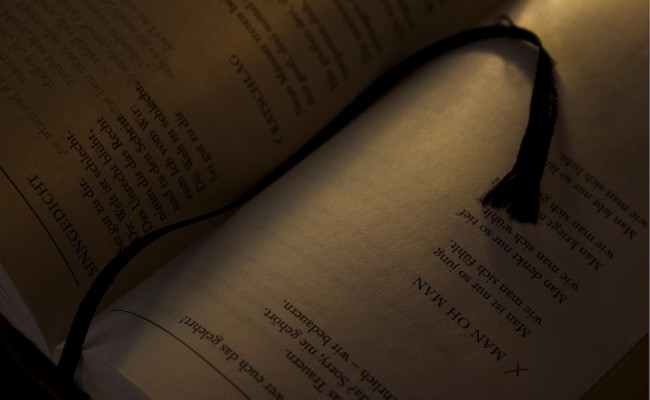Every addicted reader has a secret story about why they read and how they started and what reading meant to them as a child, a secret often disguised in adulthood as some odd and frankly unbelievable story about being carried away on the wings of imagination. The reality is usually slightly more desperate and has a strange epistemology buried inside it. The reason why you read – why you really read – you keep a secret because, if you didn’t, you’d probably have to stop reading altogether while you put your mind back together, cleaned up all the empty gin bottles and wiped away your tears.
I pile the books I’m currently reading on either side of my pillow. It’s easier than trying to reach in and out of the mosquito net, and the bedside table is full of books anyway. So, if I’ve currently got untidy heaps of books bracketing my head while I’m asleep, what on earth does that mean? When I think of myself lying in bed asleep, half smothered in books, I wonder what the fuck I’m turning into. If I were able to take a photo of myself sleeping, my head would be surrounded by a cloud of books. And not surprisingly my dreams are often filled with snippets and images from what I’m reading. It’s as if my dreams are carrying out a further reading for me, re-reading the text, reading myself, and reading myself reading. Maybe a library of books is just a hall of mirrors.
Adam Phillips, the current editor of The Penguin Freud Reader, and someone who once described his own reading habits as ‘a private delirium’, said that Bob Dylan’s Blood on the Tracks meant more to him than anything Freud ever wrote. It’s an instructive comment, I think. Phillips, a very fine essayist, has built a substantial professional career as a writer commenting on literature, on reading and on psychoanalysis. But his statement about Dylan suggests that behind all our various personas, our achievements, our political commitments is a private delirium, something that reveals that of which we can never speak, of which we only allow someone else to speak for us, enigmatically.
When I was eight or nine, I walked across town to the local library whenever I had the chance. On these long walks I used to practice sending thought-messages to my future adult self. When I think back on that time, I seemed to be looking for the words to speak of myself, looking perhaps for the book that may have jumped across time, maybe a book written by my future self in response to the messages I was sending. There seemed no one to whom I could communicate my unhappiness and my curiosity, until I finally understood that the one person who could hear and listen to me was me: that I could understand myself. At least, that it is how it seems so many years later. I was in effect continually calling out to my future self to remember. I had a sense of my grown-up self being in another room pre-occupied with some unseen task. Sometimes it felt as though I was calling out into my dreams while I was still awake.
As result of reading so much, I became a person who quotes. It would be unbearably tedious to others if I were constantly prefacing my conversation with statements like ‘As Orwell once said …’ So instead I just quote. I don’t intentionally pass the passages off as my own words but they are a kind of private happiness, a secret humour, and I mentally halo them in parentheses. I quote almost all the time and, of course, a number of quotes tend to re-occur in my speech, becoming comforting habits.
I have a cover story, too, using quotes that are obviously quotes – ‘You have debauched my sloth’, ‘I was calling on ten million dollars’, ‘You don’t need to see his identification’ – to cunningly draw attention to the fact that I occasionally quote, thereby disguising the fact that I quote continually. This means that I say and write very little that is original, having few words of my own, and whether writing or speaking, I am always quoting myself quoting others.
Before the Internet, books were all we had. Their purchase and collection now seems like an arcane process as old-fashioned as relying on telegrams for urgent communication. Reading is becoming so rapidly transformed as an experience that its future shape is unpredictable by anyone. Now whenever I’m reading a book I have the strangest feeling that I’m engaging in an act that has become somehow subversive, like reading a samizdat in Soviet Russia, slogging my way through a prose that might be hundreds of years old, but which seems to be revealing uneasy and revolutionary depths as the pages are turned.



